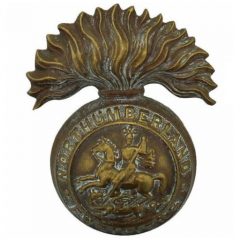'Service' Battalion
'H' Coy
'H' Company (Prudhoe) notes:
HQ - 'H' Coy detachments at Mickley, Eltringham & Throckley.
The 4th Bn adopted a four Coy system during Jan 1915.
'H' Coy amalgamating with 'D' Coy.
Officer Commanding: Capt. Cecil Chipper
.His father Ernest was a 2nd Class Civil Servant in the India Office in 1891.
Cecil was a former Cadet Col-Sgt with Durham University Contingent, Senior Division, Officers Training Corps. He was promoted to 2nd Lt in the same unit on 12 April 1910.
2nd Lt Cecil George Arkwright
Cecil’s father was a mechanical engineer originating from Barthomley in Cheshire. Cecil was born in Newcastle. At the time of the 1901 Census the family was living at 68 Park Road, Elswick, but Cecil was boarding at Sea Bank School in Alnmouth. Cecil was the Great Great Great Grandson of Sir Richard Arkwright the inventor of the Spinning Jenny.
2nd Lt Charles Osborne Provis Gibson
Charles Gibson was born in Newcastle on October 1876 and educated at Uppingham School and Oxford University. He played rugby as a forward for school and university, then for Northern, the Barbarians and Northumberland teams. On one occasion in 1901 he played for England in a test match against Wales. His brothers, George Ralph Gibson and Thomas Alexander Gibson were both Barbarians and international rugby players. Gibson was a solicitor admitted to the bar in October 1904 and practised with the firm of Clayton & Gibson, No7 Grey Street, Newcastle. His professional colleagues were William Waymouth Gibson, and John Ernest Gibson. Charles was commissioned in the 4th NF on 16th September 1914, having trained with the Uppingham School Contingent (Junior Division) of the Officers Training Corps (OTC). He was a staff Capt with the 62nd Infantry Bde in November 1915. He was awarded the Military Cross on the 3rd of June 1916, ‘Mentioned in Despatches’ in 1915 and 1918 and wounded in France on the 27th of May 1918. Staff Capt with the Cromarty Garrison in January 1919. (Solicitors War Memorial Fund, 1920)
Charles died aged 55 on the 9th of November 1931 in Stocksfield, Northumberland (Tilley, 2007) . His grave is located in the grounds of Bywell Castle
Col Sgt William Sharp
William was born in Mickley, Northumberland in 1888 , married Mary Brown in 1910, and had three boys – Reginald, Lesley and William in 1911,1913 and 1914. He was a Coal Miner ,and in the 1911 Census was designated as a Hewer. Family legend says that he was the illegitimate son of ‘landed gentry’ hence his progress through the ranks.
In 1915 William was a Warrant Officer Class 2.
William was killed on Tuesday 21st March 1916 on a day when there were only two casualties, having survived many of the key offensives in the Ypres area. He is buried in the Railways Dugouts Burial Ground, Zillebeke which I have visited.
'Reserve' Battalion (2/4th)
'H' Coy
'H' Company notes:
The 2/4th battalion became part of the newly formed 188th Bde, 63rd Divn during January 1915. The 63rd Divn was tasked with home defence, but was disbanded in Jul 1916. The 2/4th joined the 217th Bde, 72nd Division, but continued with home defence duties. The 72nd Divn was broken up Jan - Apr 1918
Officer Commanding:Capt. Arthur Jewell North
Arthur's father was John Thomas North (1842-1896), a British investor and businessman. John was born in Leeds, Yorkshire, the son of a coal merchant and a churchwarden. At the age of fifteen he was apprenticed to millwrights and engineers before working for several years as a mechanic. He moved to Chile in South America where his first occupation was as a boiler riveter in Huasco. He later moved to the Peruvian town of Iquique where he worked as a waterworks operator, importer and ship owner. The War of the Pacific (1879–1883) provided North with an opportunity to purchase large numbers of bonds in the Peruvian nitrate industry. When Chile annexed Iquique and the surrounding province of Tarapacá the Chilean government transferred ownership of the nitrate fields to the bondholders. North was thus able to take a monopoly share of the lucrative Chilean nitrate industry for a very small initial investment, becoming known as "The King of Nitrates".
Arthur originally served with the Northumberland Royal Garrison Artillery (Militia) attaining 2nd Lt in 1903. He was promoted to Captain in September 1914. Arthur was attached to the 12/13th NF and was Mentioned in Dispatches: For conspicuous gallantry and devotion to duty. This officer led his company in the attack, only four days after he had taken it over, capturing 70 prisoners and four machine guns. His leading contributed greatly to the successful issue (Supplement to the London Gazette dated 11 Jan 1919). He was killed in action on 27 September 1918.
2nd Lt Edmund Marpole Cleaton Reece
2nd Lt Paul Gibb
Col Sgt

